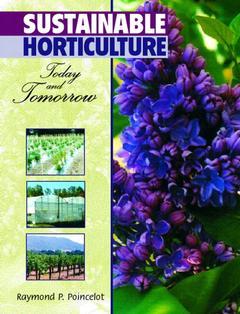Description
Sustainable Horticulture : Today and Tomorrow
Author: POINCELOT Raymond P.
Language: English
Subject for Sustainable Horticulture : Today and Tomorrow:
Approximative price 93.83 €
Subject to availability at the publisher.
Add to cart
Publication date: 02-2003
688 p. · 27.6x21 cm · Hardback
688 p. · 27.6x21 cm · Hardback
Description
/li>Contents
/li>Comment
/li>
- For Horticulture, Horticultural Science, and Plant Science courses. This comprehensive introduction to the emerging discipline of sustainable horticulture provides students with the foundations of horticultural science that underlie all forms of horticulture from conventional through sustainable to organic. The text leads students through practices and production, and provides the necessary information to support a more sustainable and environmentally friendly horticulture.
- I. INTRODUCTION TO SUSTAINABLE HORTICULTURE.
1. Moving to Sustainability.
II. INTRODUCTION TO HORTICULTURAL SCIENCE.
2. Plant Names.
3. Plant Parts and Functions.
4. Plant Processes.
5. Plant Development.
6. Plants, the Environment, and Sustainability.
III. INTRODUCTION TO HORTICULTURAL PRACTICES.
7. Plant Propagation.
8. Conventional Horticultural Crop Breeding.
9. Biotechnology.
10. Energy Sustainability.
11. Sustaining Soil, Water, and Environment.
12. Home Horticulture Basics.
13. Managing Greenhouse and Home Environments.
14. Pruning and Growth Regulators.
15. Integrated Pest Management.
IV. INTRODUCTION TO HORTICULTURAL CROPS.
16. Ornamentals.
17. Vegetables and Fruits.
18. Herbs, Medicinals, and Nuts.
- New Paradigm-Conservation, recycling, and renewal. Provides students with the details of a new approach for the balanced use of resources designed to preserve agricultural resources.
- Cutting edge techniques-Low input and sustainable crop growth, improved utilization of natural resources, natural control of plant pests, genetically modified organisms, and increased energy conservation. Provides students with the latest research on the environmental impact of conventional and sustainable horticulture.
- Comprehensive coverage. Provides students with a detailed and comprehensive picture of sustainable horticulture.
- Scientific, pragmatic presentation. Provides students with concise, simplified explanations of concepts without sacrificing accuracy.
- Balanced coverage-N
© 2024 LAVOISIER S.A.S.




